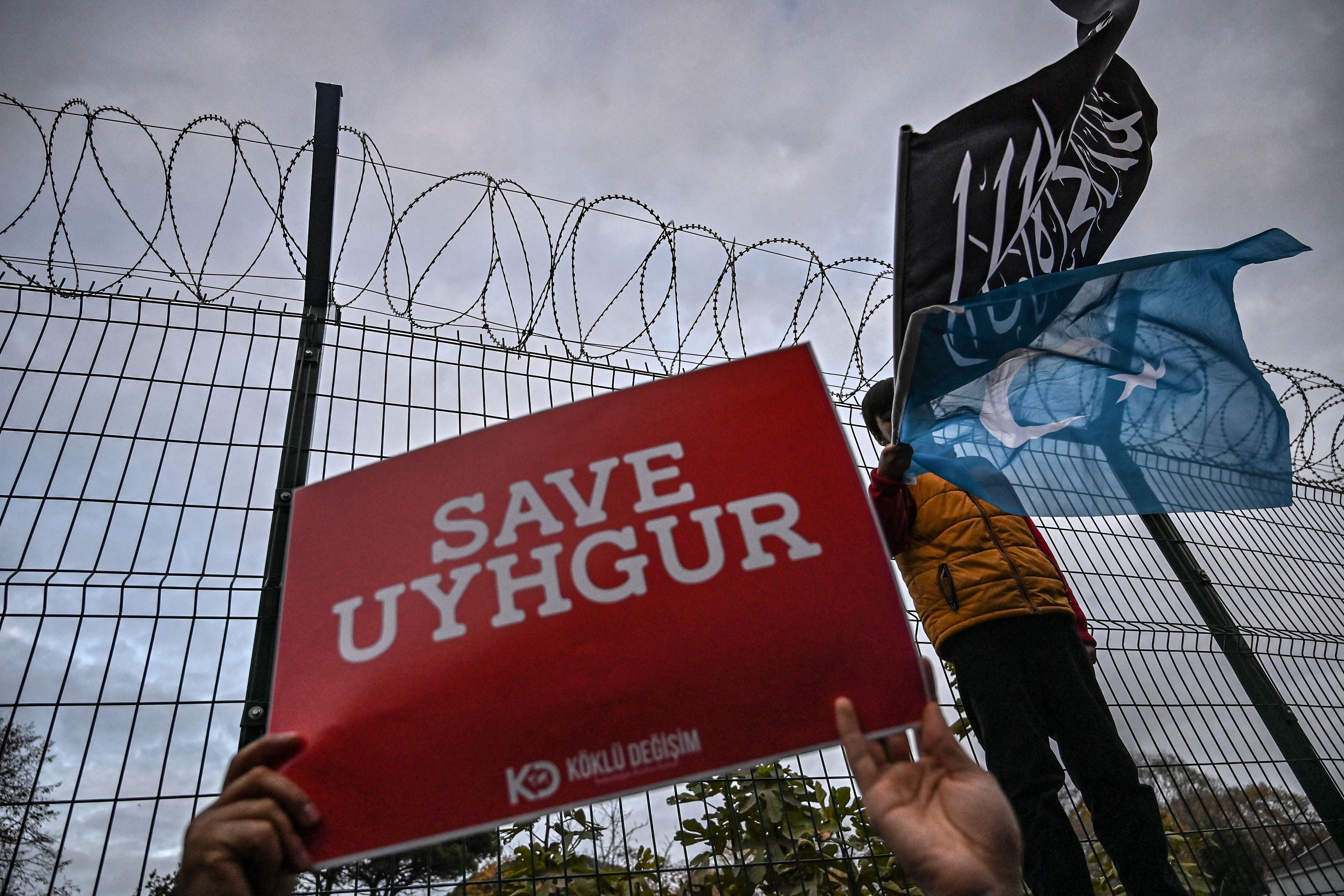Beijing Olympics comes to an end, but plight of Uyghur Muslims goes on: ‘Games were a slap in our faces’
‘People are cheering in the Olympics stadiums — and on the other side of China, Uyghurs are screaming, begging for help and release from detention camps’ says Shayida Ali, a Uyghur in exile with family still in Xinjiang. Arpan Rai reports


China is celebrating the completion of the Beijing Winter Olympics, with Sunday night’s closing ceremony bringing an end to a controversial Games that will be remembered for a major doping scandal and extremely tight Covid restrictions limiting the movements of athletes, officials and journalists alike.
But while the Olympic circus moves on, for the families of Uyghur Muslims trapped in detention camps in Xinjiang province, the sporting event has served as a “slap in the face” and a stark example of global inaction in the face of their plight.
A UN human rights panel has previously said it has credible reports that more than a million Uyghurs have been detained by the Chinese authorities in a campaign that some critics have described as “cultural genocide”. The Chinese government says the detention centres are voluntary vocational training centres, and on the eve of the Games agreed to a visit to the region by UN rights chief Michelle Bachelet – on the condition the trip should be “friendly”.
As recently as Thursday, a spokesperson for the Games’ organising committee sought to brand the allegations of human rights violations in Xinjiang as “built on lies”.
The Uyghur Muslim families that The Independent spoke to said watching the Olympics play out over the past two weeks with little in the way of protest or criticism of China’s human rights record has been hard to bear.
“The Olympics are like a slap in our faces. We were hoping the world would have stopped China,” says Shayida Ali, an Uyghur Muslim and mother of a new born, who last heard from her father in 2017. He is believed to be in one of Xinjiang’s several detention centres.
“People are cheering in the Olympics stadiums – while on the other side of China, Uyghurs are screaming, begging for help and release from detention camps. They are desperate, and crying,” she says.
As well as the mass incarcerations since 2016, monitoring groups say there are mounting fears that Uyghur Muslims may be subjected to forced organ harvesting similar to that carried out against prisoners of conscience from the Falun Gong spiritual movement, according to the London-based China Tribunal.
The China Tribunal, an independent people’s tribunal led by British barrister Sir Geoffrey Nice QC, stated that the “commission of crimes against humanity against the Falun Gong and Uyghur Muslims has been proved beyond doubt”.
Ali, who resides in Boston, says she and other family members spend most of their time looking for someone who can tell them where the authorities took their relatives.
“Evidence of forced organ harvesting, forced labour, torture, abuse, brainwashing, and even forced sterilisation, have all entered the spotlight, one after the other,” she says. “Every time I hear about these things, I feel like I have been shot, again and again.”
She says most of her time goes into looking at Google Maps to see where her father could possibly be and to track any new developments on TV.
Thirty-nine-year-old Rula Mai Hai, now an Australian citizen, recalls how the Chinese authorities tried to threaten and silence him. In August 2017, shortly before midnight, he was taken away by two policemen who flew him down to Urumqi and took him to an interrogation room.
He was handcuffed, tied to a metal chair and subjected to a barrage of questions about his wife, a Xinjiang resident. The questioning continued till 10am, without any breaks or a chance to sleep. Hours later, he was packed off to a jail and locked up in a small room with 35 other people.
He was allowed to leave Beijing in 2017, but his wife still remains in Xinjiang. China has barred him from coming back, effectively fracturing his marriage.
Serwi Huseyin, who has faced arbitrary detention and spent years waiting for her family members to return, is a walking example of fighting for survival even as half of her known family members and friends face harsh conditions they might not come out of.
She explains that Uyghurs, who have been living there for centuries, had called the area they lived in as East Turkestan.
But when the Chinese occupied the territory in 1949, they termed it Xinjiang. “Xin” means “new” and “jiang” means “territory” and “border”, she explains.
Huseyin tells The Independent how, starting in 2016, she has been receiving information that her extended family have been taken into detention.
“It all started when I did a monetary transfer from the United States to my sister’s family in east Turkestan. My nephew, Ekram Yarmuhemmed, a school graduate who was running a bookstore with his brother, was arrested just three days after receiving the money I sent,” she says.
The police, she explains, had searched their entire home and found a copy of the Quran and labelled him a religious extremist.
“So, it started with him. After some time, my brother, a popular linguist, and his brother-in-law were taken. I did some advocacy work, and my brother was released after two years of detention. So was his brother-in-law,” she adds.
But right now, her nephew Ekram is still in prison, and Huseyin has no idea when he will be released.
“My husband’s younger brother, Alim Sulayman, was also arrested and detained shortly after arriving back from Turkey. His sentence was for 17 years, just because he went to Turkey,” she says.
Her husband has been advocating for his freedom since his arrest.
“More recently, I received news that my sister’s husband, Azmad, was taken away. He was a history teacher in a military college,” she says.
Huseyin’s sister begged her to stay silent, which she says she did for a while.
But she feels it is now time for her to raise her voice on his behalf.
This is the dilemma the Uyghur Muslim community faces on a daily basis – struggling to find a way to save the lives of their loved ones.
Ali explains this struggle: “You hate yourself for not being able to do anything while your family members suffer but then if we don’t, China will think no one cares about this and go on to do the worst.
“And I think I remember that was the first thought I decided to speak up,” she exclaims.
“But once I gathered courage, another difficult period surfaced to shake me out of my stern faith: it will either get worse or get better.
“Telling this to the world is the most difficult thing, but I have no choice. I need to tell the world that my father has been captured by China and is suffering,” she says.
From being a building contractor, Almas Nizamuddin says he became an activist overnight because he’s waiting for Buzainafu Abudourexiti – his wife and high school sweetheart who he last saw when she was pregnant – to be released from detention.
“I have not seen my wife in nearly six years. People listen, and they feel very sorry for me, but follow up actions have yet to occur,” he says. “Even the photos I have of her are from five years ago.”
The suffering didn’t end there for Nizamuddin, as he received word that his mother had also been taken into detention.
“My mother, my love, they are forced into detention. I feel so guilty that I can’t bring them here to Australia. It hurts. Even if you’re living in a free country, on the inside you are not free,” he says.
“Something is out there to get you.”
“That is why I speak out for them, I have to. I do not fear retribution for speaking out,” he says.
He adds: “They have taken my wife, my child, and my mother from me. What else can they do to me?”
Rights advocates have repeatedly criticised the decision to award Beijing the Winter Olympics, given the scale of the abuses reported against minority communities including the Uyghur Muslims and Falun Gong members.
“It is incomprehensible that Beijing is qualified to hold the Winter Olympics,” says Wendy Rogers, professor and advisory board chair of the International Coalition to End Transplant Abuse in China. “The Chinese government is committing crimes against innocent people for their faith or ethnicity, including killing prisoners of conscience for their organs.
“Given this appalling record, the International Olympic Committee (IOC) should not have considered Beijing as a potential Olympic host.”
Calling on the IOC to have more stringent conditions for nations to qualify as Olympic Games hosts, Rogers suggests there should be a clause excluding states that engage in crimes against humanity or suspected genocide.
Susie Hughes, the executive director of the coalition, agrees that China should never have been allowed to host the Games in the first place.
“Once again, Olympians [have had to] perform in front of the perpetrators of genocide and horrific crimes against humanity. The IOC should never have awarded the Winter Games to Beijing whilst millions of innocent people suffer, and families are torn apart at the hands of the Chinese regime,” she says.






Join our commenting forum
Join thought-provoking conversations, follow other Independent readers and see their replies
Comments